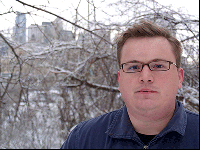Note: This article is over a year old and information contained in it may no longer be accurate. Please use the contact information in the lower-left corner to verify any information in this article.
David Oppegaard '02 talks about 'Suicide Collectors'
April 9, 2009
It didn't take David Oppegaard '02 long after leaving the Hill to find success as a writer.
His debut novel, The Suicide Collectors, has been named a finalist for the 2008 Bram Stoker Award for Superior Achievement in a First Novel. The Bram Stoker Awards, presented each year by the Horror Writer's Association, honor outstanding work in the horror field. Past award winners include household names like Stephen King, J.K. Rowling and M. Night Shyamalan.
 |
| David Oppegaard's debut novel, The Suicide Collectors, is a finalist for a prestigious Bram Stoker Award. |
In a starred review of the novel, Publisher's Weekly notes that "eloquent prose and haunting characters lift Oppegaard's astonishing debut." The Washington Post and Kirkus Reviews also praised his work. Oppegaard shares his thoughts on the plot of The Suicide Collectors, his advice for aspiring writers, and one thing he thinks every St. Olaf student should do.
The Suicide Collectors has a dark plot and eerie characters. How did you come up with the idea for this book?
I was interested in trying to imagine a new kind of apocalypse. Everyone's familiar with viral, nuclear, and environmental apocalypses. After a couple of weeks of pacing, I hit on the idea of suicide and turning it into a global epidemic.
Some of the best post-apocalyptic stories are compelling because it seems plausible that the events described could actually happen. Do you think that something like the scenario you outlined in The Suicide Collectors could happen?
I don't know if a mass suicide plague could literally happen, though there are days I'm worried humanity is trying to kill itself.
Is there a lesson about humanity that you were trying to convey with this novel?
People are tougher and, paradoxically, more fragile than they think.
How long did it take you to write The Suicide Collectors?
I began The Suicide Collectors in 2004. It started as a side project while I was working on another novel for my master's thesis. It took me about two years and several revisions to write, though it wasn't really 'finished' until I corrected the last draft in the spring of 2008.
You've already followed your first novel with a second, titled Wormwood, Nevada, that will be released this December. Do you see yourself becoming a career novelist?
I certainly hope so. I've wanted to be a novelist for as long as I can remember.
What have you learned about yourself or your writing in the process of getting a novel published?
You have to learn to be patient, whether you like it or not. Breaking into the publishing industry can take a long time, and once you're in, there's no guarantee you'll succeed.
Were there classes at St. Olaf that prepared you well for your work as a writer?
I think they all helped in various ways, even French, which almost destroyed me. I worked a lot with the writer-in-residence Jim Heynen, who has since retired, and took every fiction class the English Department had to offer.
Are you surprised at how well your first published novel has been received?
I'm very glad it's gotten so many good reviews, but I try to disassociate myself from every review (otherwise I'll have to believe the bad reviews, when they come). I just hope the good reviews lead people to read it.
You wrote your very first novel -- which was 400 pages long -- when you were just 15. You note on your website that it will never see the light of day. Why are you so adamant about that? Will any of the other novels you wrote before The Suicide Collectors ever see the light of day?
Ah, well, I was mostly kidding about that. Usually your first novel isn't very polished, and mine was no exception. It was about an alien named Zil who escapes from his home world after a violent revolution. He goes on a quest across the universe and returns to battle the rebels and free his world.
There's one unpublished novel, Knocking Over the Fishbowl, that I'd still like to see published. It's actually a comedic novel about a mental patient who escapes to the suburbs and causes havoc in the lives of its residents.
You've worked in a variety of occupations, from an optician to a standardized test scorer to a farm hand. Have you been able to weave any of those experiences into your writing?
I suppose you learn a lot from any job and put that into your writing. So far I can't think of any job I've put directly into a book. I try to make up as much stuff as possible when I write.
What advice would you offer aspiring writers?
Keep your head down and keep writing. Listen to good advice, but trust your gut. Eventually you'll find your authorial voice.
Anything else you would like to add?
I traveled abroad a lot while I was at St. Olaf. I'd encourage any students reading this to do the same, no matter what area you're studying. Get out there and see the world!
